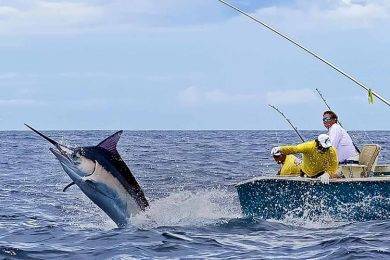Sometimes, as a sea fisherman, you come across certain problems while fishing. That’s why I’ve put together the top five tips for you, so you don’t have the same problems I did. Next week, five new sea fishing tips!
Also fish for bass at high tide
When you go fishing for bass, always make sure you catch at least the tide! Many anglers think that just going up the pier at low tide is enough to jump into the water. But in practice, it works differently! Indeed, at high tide, you can no longer walk on most jetties, but the fish come with the water! Especially at high tide there are many obstacles under the water which are full of algae and small animals. Small fish will quickly go to this food reserve, and bass like to follow this fish!
Use a vertical jig instead of sinker
When going wreck fishing we often take a rigged Deep-Sea fishing Quepos rig with a large piece of lead underneath to hold the bait to the bottom in a controlled manner (eg with a squid rigged sea rig). Instead of sinker, you can also opt for a vertical jig. They are also available in different weights and by using them you can also get some nice surprises. Cod is greedy and a vertical jig can provide one big surprise as a bycatch! Cast the bait and retrieve it. Watch it until you get back to the boat. It should come right back to you. If it turns to the right, turn the grommet to the left with needle nose pliers or do the reverse if it turns to the left. A poorly developed bait does not present well and therefore does not attract fish.
Most vertical jigs have the treble hook attached to the bottom. This is fine when fishing in mid-water, but with a wreck such a treble hook gets stuck very quickly! We have a special vertical jig for this, the Pilker Norway. This vertical jig with two attachment points. Down, and halfway to the side.
When you place the treble hook on the ring halfway up the vertical jig, you have a good secondary catcher, which is also much less likely to get stuck!
Use bright red lures
Do you doubt the attractions to offer at sea? So at least bring bright red!
Bright red, also known as Japanese red, has been the most popular color when it comes to saltwater lures for years. In Scandinavian regions like Norway and Denmark, red lures are also very popular. It is therefore definitely worth having this color in stock before you start your sea fishing trip, for example this red mounted sea leader.
Don’t underestimate fish’s sense of smell
Do not underestimate the sense of smell of sea fish! A lot of anglers think smells don’t work at sea, but that’s absolutely wrong! Many marine fish, such as cod, have a very keen sense of smell. So, when fishing on a wreck with a rigged sea leader, attach some fish waste or a piece of sea worm to your hook. It can make a big difference! Especially on days when the fish bites softly, this extra smell stimulus can be the trigger that persuades the fish to bite!
Flabby sandworms? Add sawdust
The lugworms are a very good bait, but unfortunately they do not last very long. After a long day of fishing, lugworms may feel a little weak and less firm. Next, add sawdust to your worms. When they have been crawling through it for a while, you will notice that the sawdust is absorbing a lot of moisture from the worms. The sea worms will thus be firmer and come off less quickly.
If you want to keep worms for a longer period, it is best to do so in a bucket of seawater. Remember to change this water regularly and remove any dead worms. Dead worms give a lot of waste, which also affects other worms. To put sandworms on the hook properly, you will need a worm needle. Make sure you always have one with you, and another in your box, so you never miss it. If you are looking for a good bait for sea bass, spread or rock fish, then try the large Gravette (rag worm).
Closing remarks
I hope you can quickly apply tips 1-5 for sea fishing. Next week I will post a blog with tips 6-10 for sea fishing! Do you have any advice for other readers? Leave them in the comments.
Good luck sea fishing!
Alton Clarke was born and raised in Syracuse. He has written for MSNBC, The Business Insider and Passport Magazine. In regards to academics, Alton earned a degree from St. John’s University. Alton covers entertainment and culture stories here at Diving daily.











